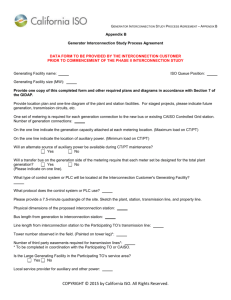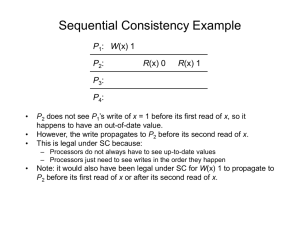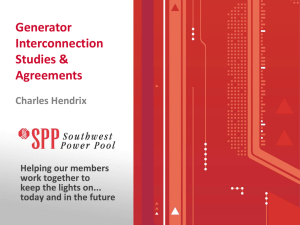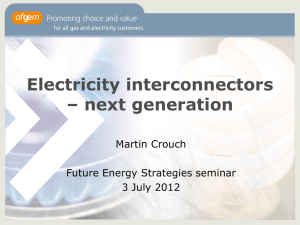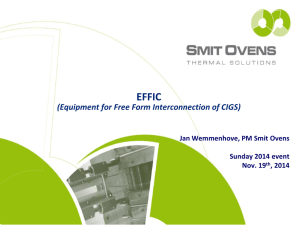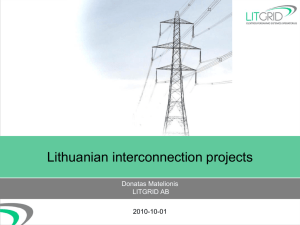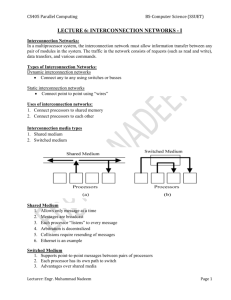3. Distributed Generation Interconnection and
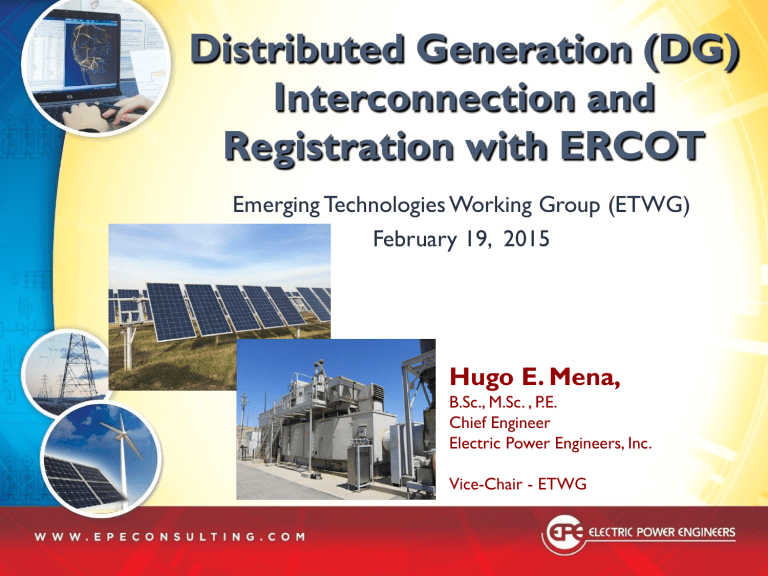
Distributed Generation (DG)
Interconnection and
Registration with ERCOT
Emerging Technologies Working Group (ETWG)
February 19, 2015
Hugo E. Mena,
B.Sc., M.Sc. , P.E.
Chief Engineer
Electric Power Engineers, Inc.
Vice-Chair - ETWG
•
In business since 1968
•
Offers consulting services to electric utilities and private generators, in particular renewable energy generators
•
Specializes in:
• Transmission grid deliverability analysis
• Distribution/Transmission planning
• Management of grid interconnection
• Congestion and curtailment analysis
• Market pricing and nodal analysis
• Design & Equipment grid compliance
• Project testing and inspection
Overview
1.
Generator Interconnection Basics
2.
Distributed Generation (DG)
3.
DG Interconnection
4.
ERCOT DG Registration
5.
Summary / Conclusion
6.
Questions to Debate
7.
Q&As
Generator Interconnection Basics
Interconnection to the Transmission/
Distribution Grid is the first step in the process necessary for a generator to deliver/sell energy to load.
Generator Interconnection Basics cont’d
First three questions to determine the guidelines for the Interconnection Process:
What is the Size of the Generator?
Where will the Generator interconnect?
Will the generator participate in the “Market”?
Generator Interconnection Basics cont’d
What is the Size of the Generator?
Distribution Interconnection < 1 MW: Small commercial or residential systems behind the meter applications to offset load.
Typically no studies are required for projects less than 20 kW.
Distribution Interconnection > 1 MW: Greater than 1 MW, less than 10 MW, and connected to a voltage less than 60 kV.
Interconnection Study should be completed by Distribution
Provider.
Transmission Interconnection : Projects greater than 10 MW and connected to 60 kV or greater. Two study stages, the
ERCOT Screening Study and the Transmission Provider Full
Interconnection Study.
Generator Interconnection Basics cont’d
Where will the Generator interconnect?
Transmission or Distribution interconnection?
Determine the Point of
Interconnection
Identify the service provider
Generator Interconnection Basics cont’d
Will the generator participate in the “Market”?
ERCOT Registration is needed for both distribution and transmission projects.
Generator Interconnection Basics cont’d
Distributed Generation (DG)
The ERCOT Nodal Protocols define Distributed Generation
(DG) as:
An electrical generating facility located at a Customer’s point of delivery (point of common coupling) ten megawatts (MW) or less and connected at a voltage less than or equal to 60 kilovolts (kV) which may be connected in parallel operation to the utility system.
Additionally, the Nodal Protocols define Distributed
Renewable Generation (DRG) as:
An electric generation with a capacity of not more than 2,000 kW provided by a renewable energy technology that is installed on a retail electric Customer’s side of the meter.
DRG is considered as a subset of DG
Applications…
DG Interconnection
Studies…
Agreements…
DG Interconnection cont’d
Once a project location has been identified, contact the applicable Distribution Service Provider (DSP) to discuss connecting to their system and request the applicable forms for the Interconnection Application.
Submit Interconnection Application – PUC Texas required data and additional technical data as required by DSP.
DG Interconnection cont’d
DSP Application Review and Studies
Studies will depend on the size and the location of the Project
Fees will apply to complete the studies
Results of the Studies will identify any facilities needed to interconnect the Project as well as any distribution system upgrades
DG Interconnection cont’d
Interconnection Agreement (IA)
PUC Texas developed an IA for distributed generation. The
IA allows for DSPs to include facilities information under Exhibit A .
DG Interconnection cont’d
Technical information required for studies varies by
DSPs.
No system wide distributed generation queue or list of projects under study.
One yearly report per DSP submitted to PUC.
Requirements vary from utility to utility.
Distribution wheeling charges may apply to generation projects that want to participate in the
ERCOT Wholesale Energy Market.
DG Interconnection cont’d
Little information available to ERCOT for current DG projects.
DG is not required to provide Real-Time data via Telemetry.
Possible Data Acquisition
Requirements
> 1 MW and < 10 MW
SCADA telemetry for total generation and load data.
-MW / MVARs
- POI Voltage
ERCOT DG Registration
DG projects that want to participate in the ERCOT Wholesale
Energy Market and are greater than 1 MW, will need to register with ERCOT.
Individual DG Resource installations of less than 1 MW and for which production nets with customer load are not required to be registered with ERCOT.
DG is not required to be part of the Network Operations Model and the Qualified Scheduling Entity (QSE) is not required to provide Real-Time data via Telemetry.
DG units are not dispatched by ERCOT’s Security
Constrained Economic Dispatch (SCED) engine.
ERCOT DG Registration cont’d
DG has two metering options:
ERCOT Polled Settlement (EPS) meter or
TDSP-Read Generation Meter.
EPS Meter data will be included in Initial, Final and True-Up
Settlements per the settlement calendar.
TDSP-Read meter data will be applied for Settlement by
Operating Day once data is received from the TDSP, generally on a monthly basis.
DG resources are settled at the appropriate Load Zone
Price.
Summary / Conclusion
DG interconnection application requirements vary by DSP for DG projects.
A universal interconnection agreement is already available from PUC Texas and it is being used by
DSPs.
DG projects greater than 1 MW must register with
ERCOT to be able to participate in the Wholesale
Market.
DG settlement will be paid at the appropriate Load
Zone Price.
No telemetry requirement for DG projects.
Questions to Debate
Should ERCOT take a more active role with DG projects interconnection?
Will a DG interconnection list benefit the market?
What benefits does the registration bring to developers other than participating in the Wholesale Market?
Should new DG installations operating in the Wholesale market be required to provide real-time telemetry?
Q&As
Hugo E. Mena, P.E.
Chief Engineer
Electric Power Engineers, Inc.
hmena@epeconsulting.com
